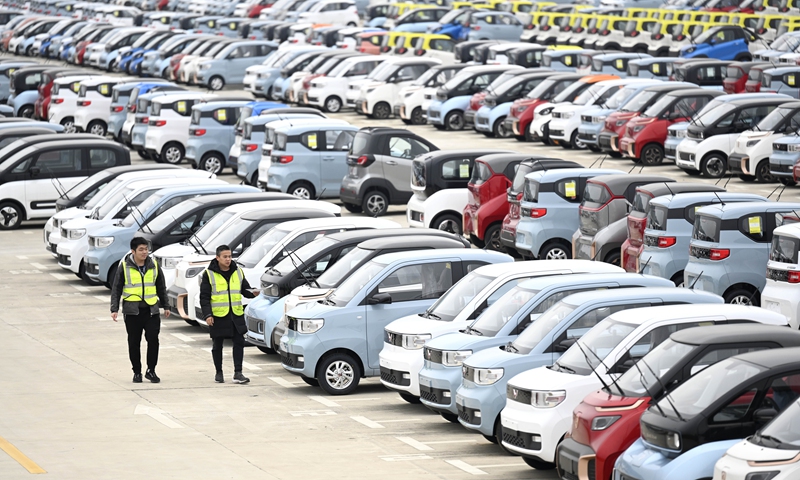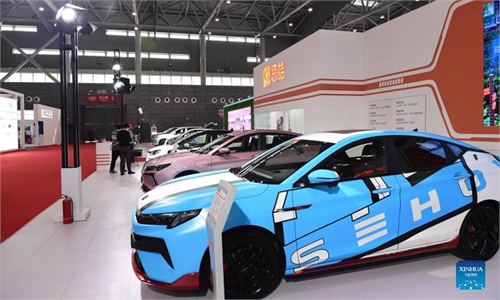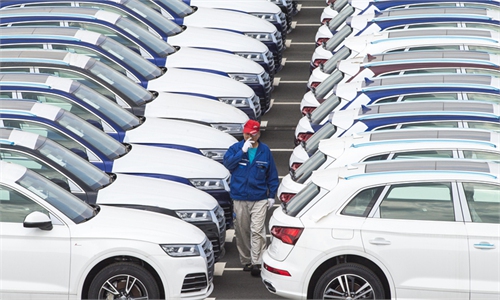Some NEVs retain strong momentum while China’s auto production and sales in April decline amid COVID-19 flare-ups

Workers check new energy vehicles at a logistics park in Liuzhou, south China's Guangxi Zhuang Autonomous Region, March 8, 2021. Liuzhou is a famous automobile industrial base.Photo:Xinhua
Industry insiders believed that the auto market would rebound in May as the auto parts supply chains return to normal.
Impacted by the epidemic, some vehicle manufacturing enterprises as well as auto accessory companies in the core areas of the auto industry like Shanghai and Jilin have suspended production, and sales outlets halted operation in accordance with local strict anti-epidemic measures, leading to the decline in auto production and sales across the country.
Great Wall Motors released its report on production and sales Monday night, showing that 55,284 vehicles were produced in April, down 38.47 percent year-on-year; 53,777 vehicles were sold, a decrease of 41.41 percent compared with last year.
The decline in production and sales is not an isolated phenomenon, several other companies disclosed their production and sales data on the same day.
Changan Auto sold 115,700 vehicles in April, down 42.78 percent year-on-year, with the cumulative sales this year totaling about 767,200 units, narrowing 9.02 percent; Haima Auto cumulatively sold 8,870 vehicles this year, down 15.27 percent; the sales of Isuzu Motors reached 17,200 units in April, squeezing 48.61 percent from last year.
According to the latest data released by the China Passenger Car Association (CPCA), China’s retail sales of passenger cars reached 1.04 million units in April, down 35.5 percent year-on-year.
While overall demand in the automotive market stayed low in April, NEVs sales grew rapidly. Dongfeng Peugeot announced on Sunday that it sold 7,044 cars in April, down 66.29 percent; while the sales of NEVs reached 1,237 units, up 18.26 percent year-on-year.
Previously, a number of NEV companies have announced sales data in April. Among them, BYD's NEV sales reached 106,000 units, soaring 313 percent and continuing to top the sales list in China.
In addition to the decline in auto sales, some auto parts companies shut down production and transportation due to the epidemic, leading to the reduction of vehicle companies delivery.
Data from the CPCA revealed that China produced 969,000 units of passenger cars last month, down 41.1 percent year-on-year and 46.8 percent from March.
Nio delivered 5,074 new vehicles in April, down 28.56 percent year-on-year and 49.18 percent month-on-month; Lixiang delivered 4,167 new vehicles, down 62.23 percent compared with last month.
Shen Yanan, co-founder of Lixiang, said that over 80 percent of the company’s parts suppliers are located in the Yangtze River Delta, especially in Shanghai and Kunshan, East China’s Jiangsu Province, which have suspended supply due to the epidemic.
However, experts believe that as the coronavirus is brought under control, auto sales in May are expected to increase from the previous month, with the release of the pre-inhibited demand for cars and supporting policies to promote consumption.
With the acceleration of the resumption of work and production in Shanghai's auto industry, the auto supply chain is gradually recovering. Auto makers including SAIC and Tesla, which resumed production on April 19, gradually increased their production capacity. At the same time, parts manufacturers like SKF are also resuming work, coordinating with suppliers and logistics companies to ensure raw materials into the factory and maintain production.
“I believe that the production and sales of NEVs in May will surge compared to April,” Cui Dongshu, secretary general of the CPCA said.
Global Times


